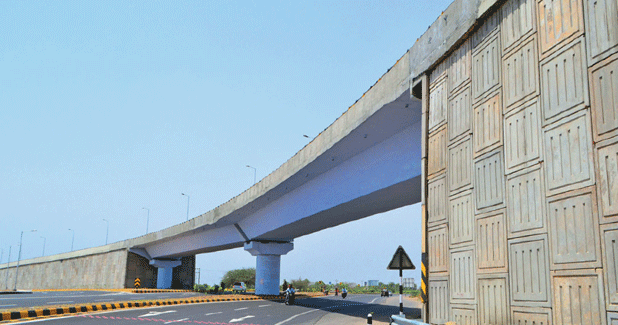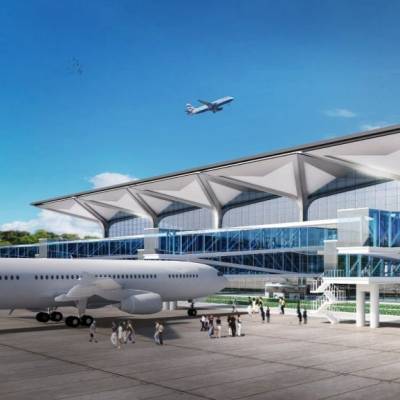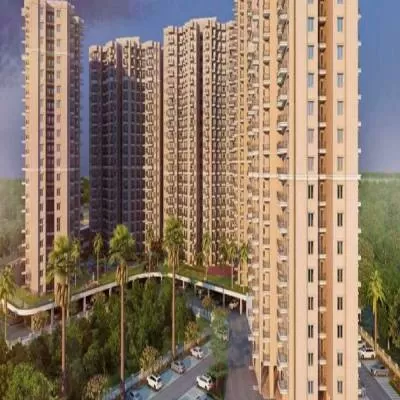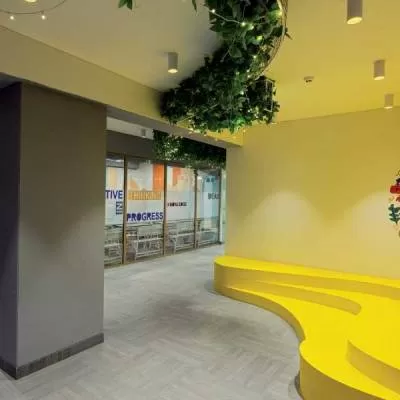- Home
- Real Estate
- Our single largest completed project was worth around Rs.700 crore

Our single largest completed project was worth around Rs.700 crore
As a company in the building infrastructure segment, Backbone Enterprises Ltd aims to showcase its technical expertise by undertaking challenging projects and executing them successfully in a timely manner. Kishor Viramgama, Chairman and Managing Director, Backbone Enterprises Ltd, shares with CW the challenges faced by contractors in the roads sector, his expectations from the Government to improve efficiency, and the importance of technology in the upcoming verticals of smart cities, solar projects and the housing sector.
What are the current projects of Backbone Enterprises?
Formerly, we were constructing buildings but now our focus is on construction of roads and highways, usually taking on four-laning of roads. We have recently received the completion certificate for four-laning of a 103-km road from the NHAI. It was a challenging project as there were 250-ft concrete structures, 40-50 lakh cu m of bituminous work and 3 lakh cu m of concrete work. The work was primarily in Saurashtra in the Jetpur to Somnath road connecting NH-8B. The project was completed in the past month; it took 27 months. A period of around six months was added owing to hurdles in land acquisition.
In recent years, Backbone´s order book has focused mostly on road projects. Is this a conscious decision, and why?
We are present in other verticals too.
But road projects require specialised expertise in terms of manpower and equipment. We boast of very capable senior staff with expertise in the roads sector along with a good fleet of equipment. In case of roadwork, there are a lot of outside challenges, like shifting of utilities, land acquisition, forest land and land encroachment. Many big companies that have completed a great amount of projects are unable to sustain themselves in the roads sector. Only companies that consider roads projects as their core competency remain in the sector, so the future remains bright.
What parameters should be used for road contractors while short-listing for a project?
Contractors that have successfully completed projects should be given priority, which is the case globally. In India, the L1 companies are usually favoured as they tend to look good on paper but their history is ignored - how many projects were undertaken, were they completed in a time-bound manner, are they blacklisted? All these parameters have to be addressed before short-listing a contractor. This procedure is followed for selecting a consultant; the same should be extended to contractors.
What is the annual investment in a road project?
If a Rs 100 crore project is undertaken, Rs 25 crore is tentatively earmarked for machinery. Also if mobilisation advance is provided on time, a 10 per cent cash investment is required for bank guarantees and other requirements.
With the Central Government´s push towards solar energy and having executed one project in the solar segment, is the company looking to enter the sector once again? Any strategies planned in this direction?
We have done a 5 MW project and two more 10 MW projects are being undertaken, taking total solar projects to 25 mw.
The 5 mw project was completed in the Kutch region near Gandhidham and was built on land bought by us. The plant was the first in Asia to utilise tracker-mounted solar panels. The 36,000 solar panels move in the direction of the sun, increasing power generation by 20 per cent. This technology is also being used in new projects being undertaken in southern Odisha. We will continue to focus on solar projects in different states as it will add to our qualification and build a financial fund for the same.
Tell us about your recently bagged projects as part of Gift City? Is the smart cities initiative a new focus segment for you?
The work carried out in Gift City is different than normal construction work. The qualification differs, the quality bar is high, and it is a PPP project with the government aiming for it to be a landmark project. It is a matter of pride to do a project here. We have completed projects in area grids, footpaths, roads, etc. Work has started on a recently bagged Rs 90 crore road project. In total, we have projects worth around Rs 200 crore in Gift City, including completed and ongoing work. As far as the upcoming 100 smart cities project is concerned, we will certainly look forward to road projects in the cities as quality is a top priority with high-end equipment, skilled manpower, special focus on safety and MIS systems.
You are doing projects in the housing sector as well...
We aim to do projects that are challenging and require special skill-sets. In housing projects, we aim to bring in the latest technologies like precast technology. At present, we are doing a turnkey housing project for the government where the requirements are predetermined but we will make use of precast technology when we do a housing project by ourselves. We have done some projects under the aegis of Backbone with two towers, Backbone Heights and Backbone Gold, in Rajkot, Gujarat.
What are the challenges faced in the roads sector?
In the roads sector, the government has to fulfil some requirements and criteria before the project is given out to contractors, such as providing ready land with shifted utilities.
If a project is undertaken, the contractor has to establish a camp, define a mining area to extract black tarp and then bring in machinery and manpower along with required materials. With regard to land acquisition, there is little clarity in the policy, which adversely affects the contractor, leading to project delays and dispute problems between contractors and the client.
How can these challenges be overcome successfully?
If ready land is made available to the road contractor, the government can save a minimum of 5 per cent of the contract value. It can subcontract the project to an expert contractor to ensure that the ready land is made available, with exact specifications provided on every aspect of the project. This will lead to decreased investment by both the government and contractors and reduce the time duration for projects. In terms of labour, materials and equipment, these factors do not pose a challenge. The technology that is available globally is being used in India as well. Dedicated manpower is placed on site so that any issue related to land is solved and the technical team takes care of technical troubles to ensure construction work is undertaken in a smooth manner.
The company has won awards for achieving 2 million safe man hours. What norms were followed to ensure safety?
Labour training is provided and safety norms are followed. Helmets, jackets and shoes some of the safety equipment a labourer is made to wear on site. Around 0.5 per cent is enough to provide safety equipment for labour.
What is the annual investment in equipment?
Investment in equipment is relative to the size of the fleet available, contracts at hand and prospective contracts; it is considered on a project-by-project basis. Having standby equipment on site is also a necessity, taking into account any technical fault in the machines, or overworking of machines at a critical juncture in the project. At present, there is no requirement for equipment as the fleet available is more relative to the turnover of the company. Profit for a contractor depends on optimum usage of equipment. A fleet of around 400 available equipment, including big and small equipment, will allow me to take up more contracts and scale up in the future.
How did the company perform last fiscal vis-a-vis EPC projects? How do you view your growth prospects in the next financial year?
We are certainly interested in bagging more EPC contracts as technical expertise is required to complete a EPC contract.
I do not foresee a huge jump in the rate of growth for the company as we do not undertake projects just to fill our order books. At present, our order book is around Rs 1,200 crore.
The single largest project we have done was worth around Rs 700 crore.
FACT SHEET
Year of establishment: The Company started in 1991 as a partnership firm and converted to a Limited firm in July 2002.
Top management:
Kishor Viramgama (BE - Civil), Chairman and Managing Director;
Bhupendra Pachani (BE - Civil), Director - Technical;
Bhovan Rangani (BA), Director - Finance;
Barada Prasad Mohapatra (BE - Civil), Executive Director
Areas of operation: Roads and bridges; building and structures; water supply, solar power; mining; general infrastructure
No. of employees: 1,500
Some of major projects: Four laning of Nagpur-Saoner-Betul Road; Maharashtra; two lane Morbi-Navlakhi-Maliya-Pipaliya Road in Gujarat (annuity basis), four laning of Jetpur-Somnath Road, Gujarat (Provisional Completion Certificate received, except Junagadh Bypass due to non availability of land)
Ongoing projects: Widening and strengthening of Borigumma-Raniguda Road, Odisha; Kalinga-Raikia-Nuagaon (SH-7A) in Odisha; and Koraput-Boriguma Road, Odisha.
Turnover: Provisional turnover for 2014-15 is about `575 crore
Order book: Expected to reach Rs.1,500 crore
For suggestions on contracts, write in at feedback@ConstructionWorld.in
- Kishor Viramgama, Chairman and Managing Director, Backbone Enterprises Ltd As a company in the building infrastructure segment, Backbone Enterprises Ltd aims to showcase its technical expertise by undertaking challenging projects and executing them successfully in a timely manner. Kishor Viramgama, Chairman and Managing Director, Backbone Enterprises Ltd, shares with CW the challenges faced by contractors in the roads sector, his expectations from the Government to improve efficiency, and the importance of technology in the upcoming verticals of smart cities, solar projects and the housing sector. What are the current projects of Backbone Enterprises? Formerly, we were constructing buildings but now our focus is on construction of roads and highways, usually taking on four-laning of roads. We have recently received the completion certificate for four-laning of a 103-km road from the NHAI. It was a challenging project as there were 250-ft concrete structures, 40-50 lakh cu m of bituminous work and 3 lakh cu m of concrete work. The work was primarily in Saurashtra in the Jetpur to Somnath road connecting NH-8B. The project was completed in the past month; it took 27 months. A period of around six months was added owing to hurdles in land acquisition. In recent years, Backbone´s order book has focused mostly on road projects. Is this a conscious decision, and why? We are present in other verticals too. But road projects require specialised expertise in terms of manpower and equipment. We boast of very capable senior staff with expertise in the roads sector along with a good fleet of equipment. In case of roadwork, there are a lot of outside challenges, like shifting of utilities, land acquisition, forest land and land encroachment. Many big companies that have completed a great amount of projects are unable to sustain themselves in the roads sector. Only companies that consider roads projects as their core competency remain in the sector, so the future remains bright. What parameters should be used for road contractors while short-listing for a project? Contractors that have successfully completed projects should be given priority, which is the case globally. In India, the L1 companies are usually favoured as they tend to look good on paper but their history is ignored - how many projects were undertaken, were they completed in a time-bound manner, are they blacklisted? All these parameters have to be addressed before short-listing a contractor. This procedure is followed for selecting a consultant; the same should be extended to contractors. What is the annual investment in a road project? If a Rs 100 crore project is undertaken, Rs 25 crore is tentatively earmarked for machinery. Also if mobilisation advance is provided on time, a 10 per cent cash investment is required for bank guarantees and other requirements. With the Central Government´s push towards solar energy and having executed one project in the solar segment, is the company looking to enter the sector once again? Any strategies planned in this direction? We have done a 5 MW project and two more 10 MW projects are being undertaken, taking total solar projects to 25 mw. The 5 mw project was completed in the Kutch region near Gandhidham and was built on land bought by us. The plant was the first in Asia to utilise tracker-mounted solar panels. The 36,000 solar panels move in the direction of the sun, increasing power generation by 20 per cent. This technology is also being used in new projects being undertaken in southern Odisha. We will continue to focus on solar projects in different states as it will add to our qualification and build a financial fund for the same. Tell us about your recently bagged projects as part of Gift City? Is the smart cities initiative a new focus segment for you? The work carried out in Gift City is different than normal construction work. The qualification differs, the quality bar is high, and it is a PPP project with the government aiming for it to be a landmark project. It is a matter of pride to do a project here. We have completed projects in area grids, footpaths, roads, etc. Work has started on a recently bagged Rs 90 crore road project. In total, we have projects worth around Rs 200 crore in Gift City, including completed and ongoing work. As far as the upcoming 100 smart cities project is concerned, we will certainly look forward to road projects in the cities as quality is a top priority with high-end equipment, skilled manpower, special focus on safety and MIS systems. You are doing projects in the housing sector as well... We aim to do projects that are challenging and require special skill-sets. In housing projects, we aim to bring in the latest technologies like precast technology. At present, we are doing a turnkey housing project for the government where the requirements are predetermined but we will make use of precast technology when we do a housing project by ourselves. We have done some projects under the aegis of Backbone with two towers, Backbone Heights and Backbone Gold, in Rajkot, Gujarat. What are the challenges faced in the roads sector? In the roads sector, the government has to fulfil some requirements and criteria before the project is given out to contractors, such as providing ready land with shifted utilities. If a project is undertaken, the contractor has to establish a camp, define a mining area to extract black tarp and then bring in machinery and manpower along with required materials. With regard to land acquisition, there is little clarity in the policy, which adversely affects the contractor, leading to project delays and dispute problems between contractors and the client. How can these challenges be overcome successfully? If ready land is made available to the road contractor, the government can save a minimum of 5 per cent of the contract value. It can subcontract the project to an expert contractor to ensure that the ready land is made available, with exact specifications provided on every aspect of the project. This will lead to decreased investment by both the government and contractors and reduce the time duration for projects. In terms of labour, materials and equipment, these factors do not pose a challenge. The technology that is available globally is being used in India as well. Dedicated manpower is placed on site so that any issue related to land is solved and the technical team takes care of technical troubles to ensure construction work is undertaken in a smooth manner. The company has won awards for achieving 2 million safe man hours. What norms were followed to ensure safety? Labour training is provided and safety norms are followed. Helmets, jackets and shoes some of the safety equipment a labourer is made to wear on site. Around 0.5 per cent is enough to provide safety equipment for labour. What is the annual investment in equipment? Investment in equipment is relative to the size of the fleet available, contracts at hand and prospective contracts; it is considered on a project-by-project basis. Having standby equipment on site is also a necessity, taking into account any technical fault in the machines, or overworking of machines at a critical juncture in the project. At present, there is no requirement for equipment as the fleet available is more relative to the turnover of the company. Profit for a contractor depends on optimum usage of equipment. A fleet of around 400 available equipment, including big and small equipment, will allow me to take up more contracts and scale up in the future. How did the company perform last fiscal vis-a-vis EPC projects? How do you view your growth prospects in the next financial year? We are certainly interested in bagging more EPC contracts as technical expertise is required to complete a EPC contract. I do not foresee a huge jump in the rate of growth for the company as we do not undertake projects just to fill our order books. At present, our order book is around Rs 1,200 crore. The single largest project we have done was worth around Rs 700 crore. FACT SHEET Year of establishment: The Company started in 1991 as a partnership firm and converted to a Limited firm in July 2002. Top management: Kishor Viramgama (BE - Civil), Chairman and Managing Director; Bhupendra Pachani (BE - Civil), Director - Technical; Bhovan Rangani (BA), Director - Finance; Barada Prasad Mohapatra (BE - Civil), Executive Director Areas of operation: Roads and bridges; building and structures; water supply, solar power; mining; general infrastructure No. of employees: 1,500 Some of major projects: Four laning of Nagpur-Saoner-Betul Road; Maharashtra; two lane Morbi-Navlakhi-Maliya-Pipaliya Road in Gujarat (annuity basis), four laning of Jetpur-Somnath Road, Gujarat (Provisional Completion Certificate received, except Junagadh Bypass due to non availability of land) Ongoing projects: Widening and strengthening of Borigumma-Raniguda Road, Odisha; Kalinga-Raikia-Nuagaon (SH-7A) in Odisha; and Koraput-Boriguma Road, Odisha. Turnover: Provisional turnover for 2014-15 is about `575 crore Order book: Expected to reach Rs.1,500 crore For suggestions on contracts, write in at feedback@ConstructionWorld.in




















